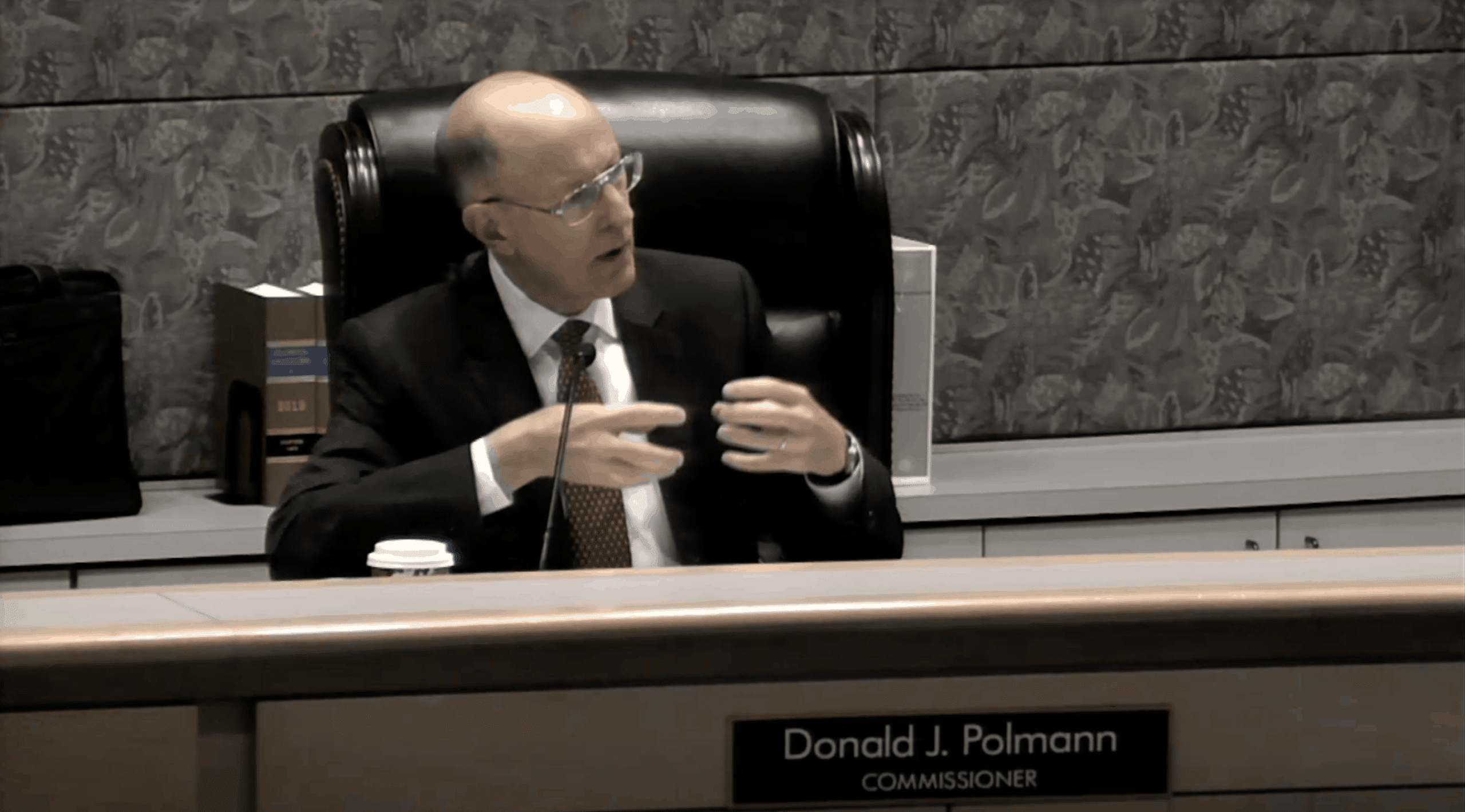Candidates Vie for Influential Florida Public Service Commission Seat

August 12, 2020 Update – The final shortlist to be presented to Gov. DeSantis is: Commissioner Polmann, Sen. Lee, Rep. Raschein, Rep. La Rosa, as voted on by the PSC Nominating Council, made of 12 seats, 11 of which are currently filled. Coates, Hamilton, and Varghese withdrew their names from the application process. Rep. Raschein and Rep. La Rosa both received unanimous support from the Council. Commissioner Polmann received 10 votes, and Sen. Lee received 8. Per Florida Statute Gov. DeSantis has thirty days from receipt of the shortlist to make his selection, which is then subject to Senate confirmation. If he does not make a selection, the Nominating Council shall appoint a selection from the shortlist by majority vote.
The meeting was streamed by the Florida Channel. A recording will be made available at https://thefloridachannel.org/
- Eight applicants range from retired FBI to current Florida Legislators (La Rosa, Lee, Raschein)
- Nominating Council to select shortlist on Aug 12
- Final Appointment made by Gov. DeSantis, confirmed by Senate
Florida Public Service Commissioner Polmann’s seat is up for re-appointment, and eight individuals have applied to fill the position, including Polmann, who applied for a second term. The positions are based in Tallahassee, have an annual salary of $132,036, and come with access to a full staff and significant statewide regulatory power and authority. That salary is far higher than the pay for a Florida legislator of about $30,000, which may be part of the reason that legislators frequently apply for the job. The Florida Public Service Commission (PSC) regulates all Florida utilities, including some municipal and co-op electric utilities, and all investor-owned entities providing natural gas, electricity, water, wastewater, and telecommunications services to Floridians.
A Nominating Council composed of 12 individuals appointed by the Senate President and Speaker of the House is reviewing the PSC candidates’ applications. The Nominating Council has one vacancy, to be filled by Senate President Bill Galvano. There is no indication that the council vacancy will be filled prior to the selection of the next Public Service Commissioner, Nominating Council staff told EPI. The Nominating Council is scheduled to meet on August 12 to discuss PSC applicants, designate and interview the “most qualified,” vote, and then finalize a shortlist. There is no limit to how many candidates the Council can recommend as “most qualified.” Gov. Ron DeSantis will make his choice from the shortlist. DeSantis’ nominee is then subject to Senate approval. This appointment will be DeSantis’ first to the PSC, with another coming up next year for Commissioner Fay’s seat.
The members of the Nominating Council are:
1 – Senator Kelli Stargel, Chair (R), Lakeland (Term ends 11/3/20)
2 – Representative Bryan Avila (R), Hialeah (Term ends 11/3/20)
3 – A. Yvonne Baker, Altamonte Springs (Term ends 1/1/24)
4 – Greg Giordano, New Port Richey (Term ends 1/1/22)
5 – Representative Michael Grieco (D), North Bay Village (Term ends 11/3/20)
6 – Joshua Kellam, Palm Beach Gardens (Term ends 1/1/22)
7 – Representative Thomas Leek (R), Daytona Beach, (Term ends 11/3/20)
8 – Senator Kathleen Passidomo (R), Naples (Term ends 11/3/20)
9 – Senator Bobby Powell (D), West Palm Beach (Term ends 11/3/20)
10 – Brian Powers, Indiantown (Term ends 1/1/21)
11 – Ann Marie Ryan, New Port Richey (Term ends 1/1/21)
12 – Vacant (Term ends 1/1/24)
Turbulent PSC History
Historically, critics of the PSC have considered the body to be an agency that has been too cozy with Florida’s utilities, and one that has rubber-stamped requests.
Applicants who are not friendly with utilities have generally not been favored for the seats, and commissioners who vote against utility interests are not usually re-appointed. The Florida Senate refused to confirm former Gov. Charlie Crist’s appointees after the commissioners voted against rate hikes for Florida Power & Light and Progress Energy (now Duke Energy Florida) in 2010.
Watchdog group Integrity Florida labeled the PSC as a “captured regulatory agency” in its 2017 report. The Sun Sentinel editorialized on the topic of PSC appointments in 2017 calling it “a theater of the absurd, for which utility customers are paying an intolerable admission price.”
Some current applicants have close ties to utilities
The applicants for Polmann’s seat include:
Zachary J. Coates – CPA, retired FBI
Erick A. Hamilton – Department of Homeland Security
Rep. Michael A. La Rosa – Current Florida State Legislator
Sen. Thomas A. Lee – Current Florida State Legislator
Donald J. Polmann – Current Public Service Commissioner
Rep. Holly M. Raschein – Current Florida State Legislator
Jonathan E. Shaw – Current Soil and Water Conservation District Public Official
Soman T. Varghese – Former utility engineer
Coates is a CPA and was also a special agent for the Federal Bureau of Investigations (retired in 2017). He owns a small gas station air and vacuum company and is listed as Vice President of Coates Brothers Construction. He currently resides in Leon County, Florida and reported his net worth as $635,000. Prior to joining the FBI, he worked as a Tax Manager at Ernst & Young, LLP in West Palm Beach. He took his financial expertise to the FBI, where he focused on financial fraud, according to his resume. (Two major FBI investigations recently led to criminal charges against utilities and politicians in utility political corruption cases in Illinois and Ohio.)
During his time with the FBI, Coates was involved in a handful of higher profile cases, including a wire-fraud scheme and a probe into Leon Schools that investigated possible criminal activity in connection with numerous school construction projects. He is registered as a Democrat, but does not appear to have publicly supported candidates or made large donations.
Hamilton currently lives in Flint, Michigan, where he works part-time at the Transportation Security Administration of the Department of Homeland Security. He has a master’s degree in biology as well as a massage therapy license. His net worth is reported at $3,351. He does not appear to have a history of involvement in utility regulation or politics.
Republican Mike La Rosa (R-42) was elected to the House of Representatives in 2012 and re-elected in 2016. His district includes parts of Osceola and Polk county in Central Florida. La Rosa served on the Public Service Commission Nominating Council in 2013 and 2014. La Rosa was also Majority Whip in 2014. He was a member of the Energy and Utilities Subcommittee from 2013-2016. In 2014, he co-sponsored the Renewable Energy Source Devices bill, which prevented renewable energy devices such as solar panels from being considered in the appraised property value; the bill did not pass, but it laid the groundwork for the implementation of 2016’s “Amendment 4” initiative, which was a solar-friendly measure and is now law.
In 2015, La Rosa sponsored a bill focused on holding the Public Service Commission more accountable to the public, including live streaming meetings, term limits of three terms for appointments after 2015, and an expansion of the prohibition of ex parte communication. Democrats in the House offered numerous amendments to extend the accountability measures to the utilities themselves, including removal of the nuclear fee that FPL customers currently pay and banning utilities from entering into partnerships to do exploratory drilling for oil and gas at customers’ expense. These amendments failed, and clean energy advocates viewed the resulting bill as failing to “fix major issues affecting consumers.” The bill passed.
In 2019, as mentioned in his PSC application, La Rosa played a leadership role as Chair of the House Commerce Committee in the passage of the utility friendly undergrounding bill SB 796, which passed into law. La Rosa’s voting record gets high marks from the Florida Chamber of Commerce and Associated Industries of Florida, both of which receive large donations from investor-owned utilities. Throughout his term, he has received thousands in donations from Florida utilities, including $4,000 from NextEra Energy, $4,000 from TECO, and $5,500 from Duke Energy.
La Rosa is the owner of two real estate development companies and vice president of a third, all based in Florida, and reported a net worth of $179,502.01. He cites his real estate development experience as helping to qualify him for the PSC appointment, stating, “I have worked with both private investor-owned utilities and public municipal utility providers. I have made it a point to negotiate to reduce the cost of offsite infrastructure or otherwise soften the burden on individual ratepayers that are absorbing the cost of upgrades for new infrastructure.” He also cites his legislative background, “I’ve been deeply involved with policies regulating gas, electric, telecommunications, water, and wastewater utilities since my freshman term in the Florida House. I have taken my passion for these issues beyond just my legislative service. Joining outside organizations such as the PSC Nominating Council, Southern States Energy Board, and the American Legislative Exchange Council is where I have continued pursuing my interests in energy and utility regulatory policies at a statewide and national level.”
La Rosa is the Florida State Chairman for the utility-funded American Legislative Exchange Council (ALEC), which allows corporate members (including some utilities) to write template bills for state legislators.
Senator Lee serves District 20, which includes parts of Hillsborough, Pasco, Polk counties. A Republican and Former Senate President (2004-06), Lee announced earlier this year that he was cutting his current term two years short, effective Nov 3. At the time, he said he was considering a run for Hillsborough County Clerk of Courts, but he decided not to qualify, citing a desire to be with his family in Tallahassee.
As a senator, Lee introduced legislation that has enriched utilities with billions in new investments, with a number of his bills designed to give utilities the ability to develop infrastructure development with less oversight. In 2017, Lee introduced SB 1048 to “revise existing law relating to rights of way corridors, allow new variances for local land use regulations, and give the Public Service Commission the exclusive authority to order utilities to bury utility lines,” as reported by the Tampa Bay Times. The bill died, but Lee was successful in passing a very similar policy in 2018 via SB 494. The bill passed and is now law.
In 2019, after initially voicing some concerns, Lee still voted for a utility storm hardening bill which allowed investor-owned utilities to charge customers billions each year to bury power lines, among other investments. The bill passed, despite a 2017 University of Florida report calling undergrounding’s effectiveness into question. The Florida Office of Public Counsel also voiced its opposition when the undergrounding issue came before the Florida PSC, but the Commission gave utilities the go-ahead in a move that could cost customers up to $3 billion dollars, according to The Tampa Bay Times. In 2020, Lee’s legislation related to easements and utility infrastructure development continued in a bill to promote electric vehicles; Lee provided a substitute amendment that added major sections pertaining to utilities and conservation easements, signed into law earlier this year. Critics, including environmentalists and clean energy advocates, said that Lee’s last-minute amendment expanded the bill from its original intent of supporting electric vehicle infrastructure in a way that “could allow more construction of fuel pipelines for oil and gas in rural areas protected by conservation easements.” Lee received high marks from utility-friendly Florida Chamber of Commerce.
Lee’s wife, Laurel Lee, also resides in Tallahassee, where she currently serves as Secretary of State, appointed by Gov. DeSantis in January of 2019. While the Secretary of State has no direct interaction with the regulatory realm of the PSC, the high-profile nature of both positions could raise questions over potential conflicts of interest.
Sen. Lee has the highest net worth of the applicants, reported at $5,778,780, with assets over $6.5 million, mostly in real estate companies. He is also president and director of a 501(c)(3) non-profit organization, the Lee Family Foundation Inc. In 2000, then Gov. Jeb Bush appointed Lee to the Florida Energy 2020 Study Commission. Lee has taken about $15,000 from utilities in political contributions, including $4,500 from Duke, $1,500 from Gulf Power, $1,500 from NextEra, and $7,500 from TECO, according to state records.
Polmann currently serves on the Public Service Commission. He was appointed in 2016 by Gov. Rick Scott for a term beginning in January, 2017, after making the Nominating Council shortlist twice before, as reported by the Tampa Bay Times. Polmann holds a Ph.D. in civil engineering and is a registered professional engineer for the state of Florida. His net worth is reported as $590,000, and he lists no business interests. Prior to his PSC appointment, Polmann spent the majority of his career focused on water resources and engineering, working at Atkins, AMEC Environment & Infrastructure, and Tampa Bay Water. He listed several points related to water in his contributions as a commissioner this past term in his application.
Polmann has been vocal in questioning utilities’ proposals, often extensively. He has pushed back on utilities’ ongoing gas build-out and over-reliance, saying he had “concerns about further consolidation to natural gas.” Polmann has also raised concerns about the customer costs associated with undergrounding and tree trimming measures pushed by the utilities. In the ongoing debate over Florida’s energy efficiency standards and utilities’ goal-setting processes, Polmann reversed his stance, originally having supported the utilities’ near-zero goal proposals, and then withdrawing the motion. The PSC ultimately forced utilities to resubmit their plans in another process, and the PSC is reevaluating the FEECA (Florida Energy Efficiency and Conservation Act) rulemaking process in upcoming PSC workshops.
Polmann is a Republican and has supported Florida candidates prior to his appointment to the PSC, including donations to several Republican Florida legislators – Chris and Jack Latvala, Kathleen Peters, and Chris Sprowls – and two Pinellas County Commissioners, Dave Eggers and Ed Hooper. Polmann’s original appointment to the PSC was supported by Sen. Jack Latvala. “In a letter of recommendation on Polmann’s behalf, Latvala said he had known Polmann, a constituent, for 15 years and that Polmann “was a major player in the transformation of Tampa Bay Water from the previous agency, the West Coast Regional Water Authority,” as reported by the Tampa Bay Times.
Rep. Raschein (R-120) was elected to the Legislature in 2012, and represents the Keys and lower Miami area. Her term ends November, 2020. She worked as a Senior Legislative Aide for Republican Ken Sorensen and Democrat Ron Saunders until her own election in 2012. In addition to her legislative work, she works for Baptist Health South Florida and First State Bank of the Florida Keys. Her net worth is reported as $233,188 and she currently resides in Key Largo.
Raschein has been vocal and active on environmental and water issues, which are especially relevant to her district in the Florida Keys, where sea level rise, sunny day flooding, hurricanes and tropical storms, and water issues are a top priority for most residents In 2018, Raschein pushed for a solar + storage project in the keys to bolster storm resilience. In 2020, Raschein led the charge against Democrat Commissioner of Agriculture Nikki Fried, in an attempt to move the Department of Energy away from Fried’s purview and into the Department of Environmental Protection. She has taken $4,500 from NextEra, $3,500 from TECO, and $4,500 from Duke Energy in campaign contributions. She received high marks from Florida Chamber of Commerce and Associated Industries of Florida, both of which receive large donations from investor-owned utilities like Florida Power & Light.
Jonathan E. Shaw – Supervisor, Palm Beach Soil and Water Conservation District, Group 3 (NPA)
Jonathan Shaw currently resides in Boynton Beach, where he works as a principal hydrogeologist for the South Florida Water Management District. He first joined the South Florida Water Management District in 1978 and has worked in various environmental consulting roles since then, largely dealing with water quality issues and land use. He has also served on the Palm Beach County Ground Water and Natural Resources Protection Board for 25 years and currently serves on the Palm Beach Soil and Water Conservation District Board, which is an elected position. He was appointed to fill a vacant position on that board in early 2019 and is on the ballot for re-election in 2020.
Shaw’s current work focuses heavily on environmental and water impacts at Florida Power and Light’s Turkey Point Nuclear Plant south of Miami, including its cooling canal systems. Turkey Point has been a controversial power plant for FPL, largely due to its high water usage and negative impacts to the surrounding water supply. Shaw’s application indicates that he is responsible for coordinating with DEP on the compliance monitoring as required under the “Fifth Supplemental Agreement” which outlines the stipulations of water quality monitoring in response to FPL’s requests to uprate the nuclear plant. Shaw also advises on the “Deep Injection Well” for nuclear waste storage, as well as other elements dealing with the ongoing impacts of Turkey Point to the South Florida region and drinking water supply.
His application does not include parts A, B, and C, of the financial disclosure. However, per his qualifying paperwork for the Soil and Water Conservation District, he has no other business interests. He has not reported any contributions to his campaign for the Soil and Water Conservation District as of yet.
Engineer Soman Varghese currently lives in Fayetteville, Georgia, where he was employed for the last six years by McWane Poles as a national sales manager. His application indicated that he was laid off due to COVID-19. Previously, he spent a significant amount of his career as a utility engineer for two utilities regulated by the FL PSC, TECO from 1984-2002, and OUC from 2003-2006. Varghese holds a Master of Science in Engineering Management and is a member of several professional organizations including the Florida Municipal Electric Association, IEEE Standards Committee & Power Engineering Society, and the Florida Electric Exchange (2005 Chair.) During his time at TECO, he was on the steering committee for its involvement with United Way. He also has experience at GE Grid Solutions and the Electrical Markets Division of 3M Company. He reports his net worth at $320,000, and lists no other business interests, assets, or income.
Next Steps
The Nominating Council meets on August 12, 2020. While it is a public meeting, as of August 5th, Council staff told EPI that they were unsure if it would be live-streamed, despite the ongoing COVID-19 crisis.
Image source: Florida Public Service Commission



